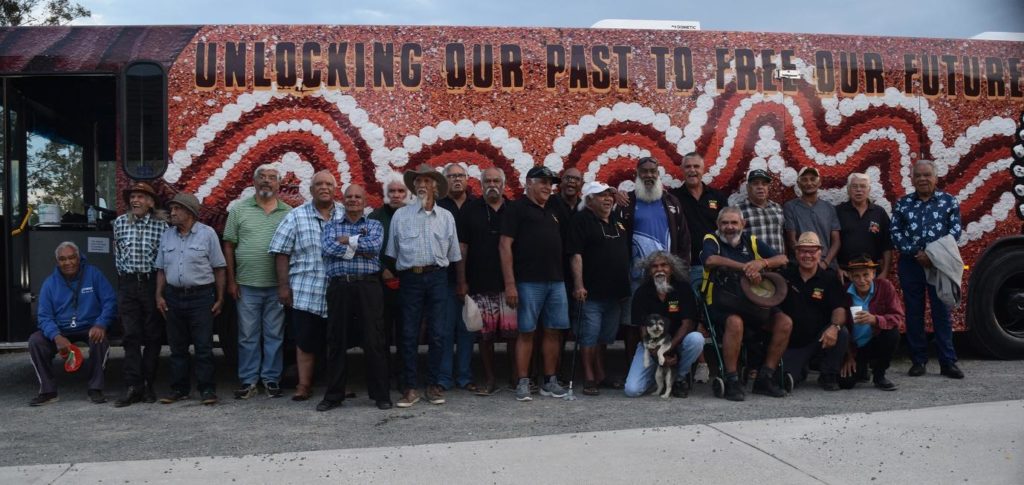The ideas and projects presented in this post are those of the survivors of Kinchela Boys Home. We acknowledge the collective and emotional labor of the survivors and well as the team at Kinchela Boys Home Aboriginal Corporation. The post was written by Tiffany McComsey and Amanda Porter with the support of research assistant Malaika Khattak, although our role has been to merely document this significant ongoing body of work. All intellectual property contained in this post is that of the Kinchela Boys Home survivors, whose lived experience and survivor expertise mark the specifics of this model to truth-telling and healing
2022 marks the 14th anniversary of the ‘Apology to Australia’s Indigenous peoples’ delivered by then Prime Minister Kevin Rudd. The Apology was made to Stolen Generations survivors. The Stolen Generations, or ‘Kidnapped Generations’ as many survivors prefer, refers to Aboriginal and Torres Strait Islander children who, under past “protectionist” and assimilationist policies, were forcibly removed from their families, raised in institutions, and fostered and adopted out to non-Aboriginal families in an attempt to extinguish their Aboriginality. These policies were acts of genocide (HREOC, 1997).
Kinchela Boys Home Aboriginal Corporation (KBHAC) is led by survivors of the Kinchela Aboriginal Boys Training Home (KBH) – one of the most notorious Stolen Generations institutions. Operating from 1924–1970, Aboriginal boys were forcibly removed from their families, institutionalised at KBH, and subjected to physical, psychological, emotional, cultural, and sexual abuse.
In 2003, KBH survivors established KBHAC. Its purpose is strengthening cultural identity, belonging, family connectedness, and to raise awareness of forced child removal and genocide. KBHAC is premised on healing and truth-telling, allowing survivors to relay their experiences without fear of being whitewashed by colonial narratives.

A recent initiative of KBHAC is the mobile education centre (MEC); a travelling bus that displays educative materials and survivor testimony. KBHAC seeks to have the MEC formally recognised as a Site of Conscience, supporting KBHAC’s mission of healing and truth-telling. This presents an opportunity for transformative outcomes for survivors, the organisation, and its audience. The MEC allows visitors to immerse themselves in KBH’s history and record their own experiences. Its educational material specifically targets young people aged 7 to 18 years old, recognising the importance of future generations in anti-genocide work. KBHAC encourages visitors to take a critical view of settler narratives that attempt to resist these memories. The MEC’s mobile nature extends the visibility of KBH beyond its geographic space to function as a mobile ‘site of conscience’ and a living, breathing, testimony to the consequences of the Stolen Generations.

Recognising the MEC as a Site of Conscience will enable it to advocate against genocide and educate on contemporary genocidal practices as an essential act of truth-telling. Many non-Indigenous Australians have relegated the legacies of the Stolen Generation to the past despite recent statistics showing that approximately 40% of children who are in out-of-home care are Indigenous despite comprising less than 4% of the Australian population.
Achieving status as a Site of Conscience is particularly important as many Stolen Generations survivors question what the National Apology has achieved. KBH survivor, Uncle Richard Campbell, feels “it wasn’t much of an apology”. He and other survivors were physically, verbally, and sexually abused, and their identities reduced to numbers. On the Apology’s 14th anniversary, he pointed out that survivors and their descendants are the ‘gap within the gap’, invisible in conversations about ‘closing the gap’ between Aboriginal and non-Indigenous Australians. He feels nothing has substantially changed since the National Apology. The MEC will ensure these atrocities are not forgotten. Instead testimony can survive and be shared “within living memory.”
Read more in, Memory, Place, and Mobility: Kinchela Boys Home Aboriginal Corporation’s Mobile Education Centre as a Site of Conscience, in the Sites of Conscience Special Issue of Space and Culture.
